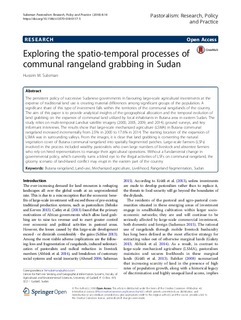Exploring the spatio-temporal processes of communal rangeland grabbing in Sudan
Journal article, Peer reviewed
Permanent lenke
http://hdl.handle.net/11250/2586598Utgivelsesdato
2018-01-01Metadata
Vis full innførselSamlinger
- Publications [1488]
Originalversjon
in Pastoralism vol. 8 no. 1 https://doi.org/10.1186/s13570-018-0117-510.1186/s13570-018-0117-5
Sammendrag
The persistent policy of successive Sudanese governments in favouring large-scale agricultural investments at the expense of traditional land use is creating material differences among significant groups of the population. A significant share of this type of investment falls within the territories of the communal rangelands of the country. The aim of this paper is to provide analytical insights of the geographical allocation and the temporal evolution of land grabbing on the expanses of communal land utilized by local inhabitants in Butana area in eastern Sudan. The study relies on multi-temporal Landsat satellite imagery (2000, 2005, 2009, and 2014), ground surveys, and key informant interviews. The results show that large-scale mechanized agriculture (LSMA) in Butana communal rangeland increased incrementally from 2.5% in 2000 to 17.6% in 2014. The starting location of the expansion of LSMA was in surrounding valleys. From the images, it is clear that land grabbing is converting the natural vegetation cover of Butana communal rangeland into spatially fragmented patches. Large-scale farmers (LSFs) involved in the process included wealthy pastoralists who own large numbers of livestock and absentee farmers who rely on hired representatives to manage their agricultural operations. Without a fundamental change in governmental policy, which currently turns a blind eye to the illegal activities of LSFs on communal rangeland, the gloomy scenario of land-based conflict may erupt in the eastern part of the country.
